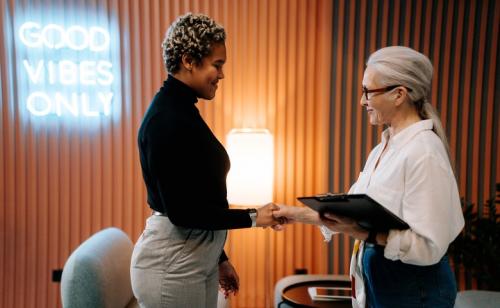A Professional Guide To Posture In Interviews

When most people learn of an upcoming job interview, they spend most of their time focusing on the answers they will give to various questions. While this is an important part of preparation, some time should also be spent on the role body language, and particularly one's posture plays in whether or not a person gets hired for the job. Rather than find themselves getting rejected and wondering what went wrong, here are some ways excellent posture in a job interview can make all the difference.
Sit Up Straight
Just like mothers have told their children forever and ever, sitting up straight during a job interview is critical. In fact, studies have shown that when people do so during their interviews, they tend to feel more confident and also feel more like a leader.
Positioning Hands and Arms
When many people are standing up or sitting down, they have a tendency to cross their arms. In body language circles, this is one of the worst things that can be done, since this clearly signals defensiveness and discomfort. Instead, job interviewees should rest their hands on their lap or perhaps a nearby table or desk. In doing so, they maintain a sense of openness and collaboration, while at the same time freeing up their hands for natural gestures or accentuating certain points during the discussion.
Don't Fidget
When people are nervous, especially during a job interview, they tend to do any one of numerous nervous behaviors, commonly known as fidgeting. This can be anything from tapping their foot nonstop to playing with their hair or tapping their fingers on a desktop. Whatever the case may be, fidgeting will be one of the quickest ways for these people to be shown the door. Once this behavior begins, the interviewer not only gets annoyed but begins to focus more on the fidgeting than the interview itself. More importantly, fidgeting is viewed as signaling a person to be untrustworthy, so it should be avoided at all costs.
Leaning Forward
While nobody wants to be known as the "close talker," it is still very important that anyone in a job interview lean forward slightly during the conversation. In doing so, this immediately conveys to the interviewer that they are very interested in what is being said. Once an interviewer senses this, it puts them at ease, makes them more interested in the person sitting in front of them, and gives them an incentive to continue the interview, increasing the odds the person being interviewed will be hired.
Maintaining Natural Eye Contact
In any situation, but especially during a job interview, maintaining a natural amount of eye contact will immediately signal high levels of trust. In fact, this type of behavior is hard-wired into the brains of all humans, and always makes whatever someone is saying more believable, which is exactly what is needed in any type of job interview.
The Best Place to Sit
Finally, when people walk into a room where they will be interviewed, they sometimes make the mistake of sitting down in the first chair that is closest to them. But in these situations, it is crucial to size up the best spot to sit in the room. Since studies have shown that sitting in the spot that allows for the best eye contact increases trust and attraction during the interview, sitting directly across from the interviewer puts the odds in an applicant's favor.
With more and more people in need of new jobs and careers, taking this advice to heart and practicing doing or not doing some of these things prior to an interview may pay off with a job offer. Boost your confidence and increase your chances of landing a job with professional training and certifications, like facility management services.Post Your Ad Here
Comments